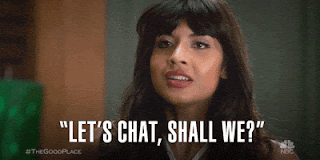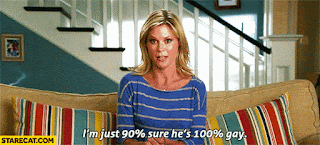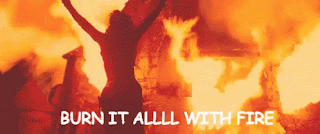Tips For Writing LGBTQ+ Characters
Greetings!
I've been wanting to do another post about diversity in fiction since I did my post on how to write female characters in fiction back in March 2021. Diversity is a pretty broad topic, and the tropes/assumptions about someone who's gay are going to be different from the tropes/assumptions about someone who's chronically ill, for example.
So, being a queer person myself, I chose to focus on how LGBTQ+ characters are written and represented in media first and maybe offer some tips.
Disclaimer: These are my personal views on this topic. No offense is meant if you disagree with me in any way. We all are entitled to our opinions.
How Important Is LGBTQ+ Representation?
Seeing a character who identifies as queer may help you figure out your own gender or sexual/romantic orientation, or it might help you with your confidence in your identity.
I couldn't remember seeing LGBTQ+ characters in any of the movies/shows I watched or the books I read until I was maybe 13 [edit: I didn't know what the word gay meant until I was eleven, so there are a few things where I know now that some of the characters were gay, but I didn't really get it until I was older].
Honestly, I don't think I would've ever figured out I wasn't straight if it wasn't for Glee [yes, I know there are a lot of problematic elements with this show, but that was the first show that had a lot of LGBTQ+ characters where I knew that the characters weren't straight]. So, yes, good representation is super, super important. Especially for, like, lesser-known sexualities, like, asexuality. Do you know how little ace representation there is? Or what about non-binary representation?
There's not a lot of that.
Basically, good representation could definitely help someone.
Writing Tips
#1: Don't Rely Exclusively On Stereotypes
Now, I have absolutely no problem with people who do just naturally fit into stereotypes. That's just naturally how they are. What I have a problem with is people making assumptions about someone based on their sexuality and then apply that to everyone [ie. feminine gay man, promiscuous bisexuals, shy and/or cold asexuals]. Create a character who doesn't fit into a stereotype. And, even if they do fit a stereotype, make them a well-written complex character.
For example, Kurt from Glee. He's interested in fashion and theater, and those are just things he's interested in, not something to be used as a cheap joke.
#3: Please Don't Queerbait. Ever. Like, Never Ever, Ever.
Also, Jessica is a queen, and you should absolutely check out her YouTube channel.
*loud sigh* So, queerbaiting, where do I even start?First of all, the term is misused a lot, so I'm just going to give the definition from Google.
Queerbaiting is a marketing technique for fiction and entertainment in which creators hint at, but do not actually depict, same-sex romance or other LGBTQ+ representation.
So, basically, queerbaiting [which usually happens in TV shows] is essentially a way for creators to get money for LGBTQ people without losing the money they're getting from more conservative viewers who don't necessarily want to see a LGBTQ+ relationship. Basically, it's when characters act like they're in love and do things that go beyond what friendship typically does [like, say, forehead kisses], but the creators insist not only that they're straight.What? Someone picked up on those hints we left? How ridiculous [ignoring the fact that who someone ships is their own business]. Don't do that.
Hinting at a romance and then actually delivering it doesn't count [slow burns with a lot of tension are a thing]. Neither does including a canonically queer character who isn't in a relationship [which isn't queerbaiting? Like, if a character's canonically queer, than it isn't queerbaiting].
#3: Do Your Research
This doesn't just apply to cishet people. It can also apply to queer people writing about someone who's a gender/sexuality that they aren't. For example, I'm cisgender, so I don't know all of the experiences of a trans person. So, be sure to do your research from people who have actually lived those experiences.
]#4: Also, Pleassssse Don't Use The Bury Your Gays Trope
This trope is....complicated, to say the least.
I mean, let me just say that I want it to burn.
Some people ask, ''But does that mean that killing off queer characters is wrong? Shouldn't I treat them like every other character?''
The problem with this trope is that there are often only one or two LGBTQIA+ characters in a show/movie/book. Killing off the only queer character can come off as a little tone deaf, just like killing off the only black character or the only woman. Killing off either the only LGBTQ+ character in a story, killing off a character after just establishing them as queer and especially having them die because of their queerness are probably the worst ways to kill off a queer character. That's not to say that all LGBTQ+ characters need to become immortal, of course. It's fiction. Characters die. Just don't do the three things listed above, treat the dead character with respect, and think about why you're killing them off and whether they really need to die.
#5: Everyone's Experience Will Be Different
Everyone's life story and their stories about their queerness will all be different. Some people have amazingly supportive parents, and some don't [and, if you don't, I'm so, so sorry. Sending you lots of virtual hugs and cake]. Some people have barely any media representation, and some people have enough that most people know what their sexuality/gender identity means [I mean, there's always room for more good LGBTQ+ representation, but you know what I mean. Most people know what the word gay means. Most people don't necessarily know what greysexual/greyromantic means]. Some people may mention their sexuality or gender identity [I mean, for gender identity makes sense. You need to know what pronouns to use] as soon as they meet someone. Others may not. Some people's sexuality/gender identity may not be a big part of their life. For other people it may be.
Unfortunately, there is still homophobia/transphobia, and most people have struggled at some point [and, if you haven't, that's great], but the individual struggles will be different.
#6: We're All Just People
And, lastly, LGBTQ+ people are still just people [except for that one friend who I'm pretty sure is an alien, but that's beside the point]. Sure, our gender identity/sexual orientation may be different from the majority of people, but we're still people.
We all have our own hobbies, our own passions, our own dreams and hopes. We're your friends, your family members, or maybe that person with cool hair that you passed in the street. Of course I do talk about my sexuality a fair amount, and I make gay jokes constantly [queer humor is the best humor and I will fight you on that. Except maybe for stuff from the Incorrect Quotes Generator because I love that site], but my sexuality isn't the only thing about me, or the most important thing. And, on that note, I'll end the tips section.
Queer YouTubers You Should Be Watching
Who doesn't like YouTube? Personally, I'm a big fan of commentary channels, especially pop-culture commentary. I also subscribe to a lot of queer people.Here are a few of my favorite YouTubers who are a part of the LGBTQ+ community, plus a few really good videos that they've made about that topic.
Queer Representation In Pop Culture
If you're a writer this section will probably be the most helpful in terms of tips. Also, there are some super talented people here.
Vera Wylde at Council of Geeks/Break Room of Geeks
Vera is one of my very favorite YouTubers. Their videos are always so well done, and also, she's a Doctor Who fan [if you are a geek of any kind, please watch her channel. The videos they make are amazing]. She's genderfluid, which I am not, so it gives me a new perspective. Here are some of my favorite videos she's done on LGBTQ+ related issues, especially in fiction.
Rowan Ellis
First of all, can I say that her accent is just delightful? Rowan also has a lot of great LGBTQ+ related content. She's very intelligent and well-spoken, with a great sense of humor, which makes her channel fun to watch.
Sarah Z
Sarah doesn't always do videos related to LGBTQ+ related topics [neither do the others on this list, but Vera and Rowan have more queer-related videos], but she has a really great one on gay fanfiction and why it's so popular, which you should really check out.
She also has some videos about double standards about diversity in media, and videos on Destiel [Supernatural] and Johnlock [Sherlock], which I'll leave down below, in case you want to watch those, too.
Jessica Kellgren-Fozard
Jessica is just the best. She's smart and super-sweet, and very funny. And I love all of her outfits. Plus, she and her wife, Claudia, are just adorable. She does a lot of videos about queer people throughout history, which is really cool.
Obviously I watch more queer YouTube vidoes, but if you want to hear more about LGBTQ+ representation throughout pop culture and/or history, these are the ways to go.
So, that's the post. Was this post helpful at all to you? Have you ever written an LGBTQ+ character/relationship? Who do you think are some well-written LGBTQ+ characters in the media? Who are some that you think aren't very well-written?





.gif)






I can't believe I didn't comment on this earlier, these are some really good tips! A majority of my cast are part of the LGBTQ+ community in my stories, while I haven't really mentioned it a lot in my posts, I just thought I would mention it because why not?
ReplyDeleteAlso, I love that you bring up Jessica Kellgren-Fozard I love watching her videos. :D
-Quinley
Thank you. Ooh, that's cool.
DeleteYes, her videos are great!
These are great tips! From my experience, 1,2, and 6 are most overlooked when it comes to stories. I've watched on of Vera's videos and have been meaning to watch more. Thanks for the recommendations for the others to check out!
ReplyDeleteThanks! Yeah, they kind of are. You should definitely check out more of Vera's videos----they're really good. You're welcome!
DeleteThanks for making this post! I am actually taking part in a little play at some point and the character I'm playing is either lesbian or bi, and I think this is going to be quite useful for that. I don't want to portray my character badly, you know? So again, thanks!
ReplyDeleteNo problem! I'm happy to help. I hope you do find this to be useful for your character.
Delete